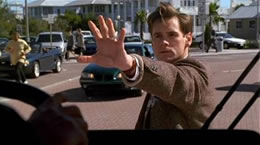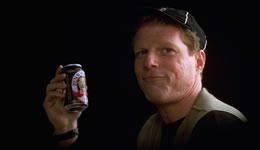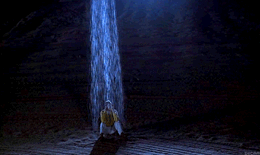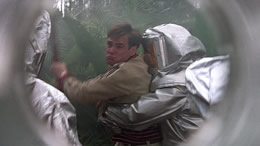The Truman Show
A Libertarian Critique
Alexander S. Peak
19 October 2011
The 1998 film The Truman Show, a libertarian drama sprinkled with comedic moments, is a modern classic written by Andrew Niccol and directed by Peter Weir. It is about an insurance salesman named Truman Burbank who, unbeknownst to himself, is the star of his own reality television show. James Berardinelli writes that, “As an intriguing, well-written piece of entertainment and a mild social commentary, The Truman Show deserves high marks.”1 The role of Truman Burbank is performed brilliantly by Jim Carrey, and Ed Johnson-Ott describes the film as “Carrey’s breakthrough movie.”2 Ted Prigge writes that “people will be blown away by how much humanity Niccol puts into his script.”3
The Truman Show is a libertarian flick, but its libertarianism is not as overt as Minority Report’s or Nineteen Eighty-Four’s. Indeed, as Alexei Kurupatin points out, the libertarian themes in The Truman Show were subtle; he says that one “wouldn’t see them right off unless [one] were hyper-sensitive to paternalism.”4 Nevertheless, scratch slightly beneath the surface, and they are unmistakably there. As Johnson-Ott puts it, “Beyond its immense value as pure entertainment, ‘The Truman Show’ is a subversive piece of work.”5
Everyone in Truman’s life is an actor. The person he thinks is his mom? An actor. The person he thinks is his best friend since age seven? An actor. The person he thinks is his wife? An actor. In fact, his entire community, which he knows as Seahaven, is, in reality, nothing more than a large, extremely expensive sound stage, a set within a huge domed sky. Thousands of cameras record Truman’s every waking—and sleeping—moment. Truman is the single most famous living human on Earth. And he knows nothing about it.
However, even the best-laid plans of mice and men eventually unravel. Nothing is permanent, and it is only a matter of time before Truman either dies or learns about his situation. Eventually, the show will end. The question, ultimately, is: how?
Throughout the course of the film, Truman obtains little clues that something is awry. Truman, who is by his nature a very curious person, wants to know why so many things appear to be revolving around him, and strives actively to uncover the truth. Carl Horowitz, in his article “Hollywood: Land of Libertarianism,” describes the situation thusly: Truman “comes to realize that his entire life, right down to his ‘marriage,’ has been a continuous reality-television soap opera, his community a voyeuristic police state.” Thus, Truman “spurns his ‘perfect’ guinea-pig existence in favor of something more human.”6 Unfortunately, this brief synopsis does not actually do the movie justice.
In order to keep Truman in Seahaven, the director of the show, Christof (played by Ed Harris), must contrive various “obstacles,” for lack of a better word. Being the director, Christof unsurprisingly holds tremendous power over Truman’s life. Still, he sees himself as a benevolent agent, providing Truman with a level of security that he would not be able to obtain in the real world. This has led some, such as Xavier Cromartie, to contend that Christof represents the central planner, the idealist who thinks that government should “become an omniscient, omnipotent entity [that] can benevolently ensure the happiness of [its] society,”—at the expense, of course, of liberty.7 Thus, Christof states that, in his opinion, “Seahaven is the way the world should be.”
Not everyone agrees with Christof. A former cast member named Sylvia, who appears to be involved in some sort of “Free Truman!” movement, for example, says to Christof, “He’s not a performer; he’s a prisoner. Look at him, look at what you’ve done to him!” To this, Christof responds so calmly and sincerely, it is almost sinister. Christof replies,
He could leave at any time. If his was more than just a vague ambition, if he was absolutely determined to discover the truth, there’s no way we could prevent him. I think what distresses you, really, caller, is that, ultimately, Truman prefers his cell, as you call it.
Christof is being, whether he admits it to himself or not, entirely disingenuous here. Truman is indeed a prisoner, as Sylvia maintains, and we can be quite certain of this when we take notice of the sort of things Christof’s henchmen do to keep Truman from leaving Seahaven. Christof and his men are not merely cajoling Truman into staying through convincing arguments, but, far more importantly, are actively aggressing against Truman in order to physically prevent him from leaving the island.
In one scene, Christof’s henchmen literally chase the innocent Truman Burbank down, grab him, and tackle him to the ground. They do this entirely without his consent. Later, the crew intentionally strikes Truman’s boat multiple times with bolts of electricity, knocking Truman into the water. After he crawls back into the boat, they blow powerful gusts of air and massive waves of water at the boat with the express intent of capsizing it. Truman, in fact, nearly drowns.
In light of these facts, Christof’s claims appear as valid as the claims of an East German soldier standing at the Berlin Wall and saying, “What? We aren’t preventing free emigration.” If liberty is freedom from aggression, and libertarianism the ideology that aims to maximise human liberty, then it stands to reason that libertarians would oppose aggression anywhere and everywhere it rears its ugly head. Thus, for the libertarian, Christof’s actions, as well as the actions of his henchmen, are unconscionable. For whatever reason—perhaps it is because of the immense power he holds—Christof seems to think it is okay for him to “play God” with Truman’s life.
Truman luckily survives. Still bravely striving for liberation and truth, Truman sails onward—that is, until he crashes into the sky. Not the real sky, of course, for Truman has likely never even seen the true sky. Rather, he crashes into the side of his dome set, onto which is painted a sky. He walks along the wall until he discovers a set of stairs. He ascends. At the top, he finds a door that says “EXIT.” He opens the door. Then Christof speaks.
Truman is taken by surprise. You would be, too. Christof explains to Truman that he is the star of his own show, a show that “gives hope and joy and inspiration to millions.” Coincidentally, millions are watching the show while Christof explains this. Christof says, “Listen to me, Truman. There’s no more truth out there than there is in the world I created for you. The same lies, the same deceit—but in my world, you have nothing to fear.” The director clearly wants Truman to turn back, to not walk through that door. Millions watch at home.
Catherine Belsey sums up the story in an interesting way:
Born on the set, Truman believes that Seahaven, domed, climate-controlled, safe, socially predictable, is all there is. He is at the mercy of a world that he does not even know is scripted. But driven by dissatisfaction and desire, in front of a worldwide TV audience,…Truman tries to leave town and travel. His efforts to escape are repeatedly frustrated, until he sails as far as the horizon and finds an exit button. The way out is a black rectangle against the plaster sky, the unknown, perhaps the void. The Truman Show juxtaposes the imaginary world of Seahaven with the reality of the audience watching the true man’s struggle to escape the fiction he believes in, and with a third term, a black hole, the real.8
Would you walk through the doorway? The Matrix makes you ask a similar question: would you take the red pill, or the blue pill? Benjamin Franklin is attributed as saying, and probably did say, “Thoſe who would give up eſſential Liberty, to purchaſe a little temporary Safety, DESERVE neither Liberty nor Safety.”9 Sure, Christof is correct that he can provide Truman with security, both economic and physical. But, truth and freedom are more important to Truman than security. Thus, the libertarian within each of us cannot help but to cheer when Truman ultimately rejects Christof’s world and walks through the doorway.
Interestingly, the show’s audience also cheers. Sure, they know that Truman’s choice to walk through the doorway means the show has effectively come to an end, but they cheer nonetheless. They want Truman to be free. Moreover, they want him to choose freedom. One has to wonder if, perhaps, the only reason they ever watched the show was in the hope of seeing Truman escape. Given their reaction, it is by no means inconceivable.
Rebecca Marie Doran Eaton sums up the subversive intention of the filmmakers rather succinctly by saying that “Weir intends that we question our world—to not simply accept the reality [with which] we are presented…but [to] struggle for freedom and truth.”10 Or, as Roger Ebert puts it, “You accept the world you’re given, the filmmakers suggest; more thoughtful viewers will get the buried message, which is that we accept almost everything in our lives without examining it very closely.”11
__________
1 James Berardinelli, “The Truman Show: A Film Review,” reelviews.net (1998, cited 19 October 2011).
2 Ed Johnson-Ott, “The Truman Show (1998): Review,” killermovies.com (7 June 1998, cited 19 October 2011).
3 Ted Prigge, “The Truman Show (1998): A Film Review,” killermovies.com (27 April 1998, cited 19 October 2011).
4 Alexei Kurupatin, “ANTZ,’ billstclair.com/lodge (4 October 1998, cited 19 October 2011).
5 Ed Johnson-Ott, “The Truman Show (1998): Review.”
6 Carl Horowitz, “Hollywood: Land of Libertarianism,” News Talk AM 690 KHNR (Saturday, 5 December 2009, cited 19 October 2011).
7 Xavier Cromartie, “The Truman Show and the Failure of Socialism,” XavierCromartie.com (18 July 2010, cited 19 October 2011). Cromartie writes, “The Truman Show demonstrates the inevitable triumph of the individual’s anarchist spirit over the controlling, self-interested socialist. All humans, at all times, must be allowed to act in a voluntary manner up to the point at which they violate another’s right to act in a voluntary manner.”
8 Catherine Belsey, Excerpted from part VI of “What’s Real?” in Critical Zone 1: A Forum of Chinese and Western Knowledge, ed. Q. S. Tong, Wang Shouren, Douglass Kerr (Aberdeen, Hong Kong; Hong Kong University Press, 2004) pp. 34–35.
9 “A Quote on Essential Liberty,” alexpeak.com (cited 19 October 2011).
10 Rebecca Marie Doran Eaton, Unheard Minimalisms: The Functions of the Minimalist Technique in Film Scores (ProQuest, 2008), p. 216.
11 Roger Ebert, “Carrey gets serious for ‘Truman,’” Star-Banner (Friday, 5 June 1998), p. On the Go 16. C.f. George Orwell, “How Do You Know the Earth is Round?” originally published as “As I Please” in Tribune (27 December 1946); Duncan Pritchard, “Truman and the Value of Testimony in the Formation of Beliefs,” excerpted from What Is This Thing Called Knowledge?, 2nd ed. (Arbingdon, Oxon: Routledge, 2006), pp. 80–84; Jacob G. Hornberger, “Freedom, Socialism, and the Truman Show,” The Future of Freedom Foundation (Tuesday, 16 September 2008, cited 19 October 2011).
Jim Carrey as Truman Burbank
Laura Linney as Hannah Gill
On the show, Gill plays Meryl Burbank, Truman’s loving “wife,” who regularly slips product placement into Truman’s life
Noah Emmerich as Louis Coltrane
On the show, Coltrane plays Marlon, Truman’s “best friend” since age seven; Coltrane is much better at product placement, and also appears to genuinely care about Truman more than any other current cast member
This pin is worn on the sweater of a character named Lauren Garland, played by a woman named Sylvia—Sylvia, in turn, is played by Natascha McElhone
This glitch was just one of the various clues indicating to Truman that something was awry
Ed Harris as Christof
Truman is chased, grabbed, and tackled by faceless goons in hazmat suits
Undeterred by the storm, Truman sails onward
Truman has crashed into the sky
Video uploaded to the Internet by YouTube user jadednex.
Here are the final scenes of the film; Carrey’s
acting here is positively outstanding.
Would you walk through the doorway?
I know I would, and I hope you would, too.All images copyright © 1998 by Paramount Pictures.
All rights reserved.








